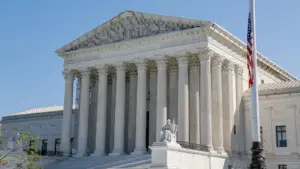As the U.S. Supreme Court reviews a case concerning the funding of religious charter schools, conservative lawmakers view it as an opportunity to challenge longstanding secular education policies and endorse greater school choice, empowered by Trump's judicial appointments.
Potential Shift in U.S. Education Landscape: Religious Charter Schools on the Rise

Potential Shift in U.S. Education Landscape: Religious Charter Schools on the Rise
A pivotal Supreme Court case may allow for publicly funded religious charter schools, reshaping the traditional education paradigm established by secular norms.
A significant transformation in the educational framework of the United States could soon become a reality as the Supreme Court prepares to examine a contentious case regarding publicly funded religious charter schools. This case, initiated by Oklahoma's officials for the St. Isidore of Seville Catholic Virtual School, raises vital constitutional questions by pitting state interests against a coalition of progressive legal groups and government professionals advocating for the separation of church and state in education.
This moment comes on the heels of President Donald Trump's pivotal reshaping of the Supreme Court. Legal experts indicate that with a 6–3 conservative majority, the Court is poised to reconsider longstanding interpretations that have historically excluded faith-based educational institutions from receiving public funding.
St. Isidore is an entirely online Catholic charter school designed to incorporate moral and ethical values into its curriculum, while adhering to the academic standards of Oklahoma. After receiving approval from the state’s virtual charter board under Republican Governor Kevin Stitt, legal challenges were swiftly brought forth by opponents who claim that funding a religious school with taxpayer money breaches the establishment clause of the Constitution. However, the Supreme Court's precedent, particularly the influential ruling in Espinoza v. Montana Department of Revenue (2020), suggests that states cannot discriminate against religious schools solely based on their religious affiliation.
The impact of Trump-appointed Justices Gorsuch, Kavanaugh, and Barrett in this potential ruling could affirm the notion that religious schools are entitled to equal treatment in charter school funding, particularly pending voluntary enrollment and compliance with educational standards.
Supporters of the case, including Republican figures, are optimistic that this could mark an important milestone in educational reform. "For decades, our education system has excluded faith from the classroom under the guise of neutrality," said Rep. Mark Green (R-TN). They argue that this situation could be the key to granting parents more choices while restoring balance within the education system.
Conversely, the Biden administration has positioned itself against the introduction of publicly funded religious charter schools, emphasizing the importance of maintaining a division between public funding and religious entities due to influences from secular advocacy groups. Nevertheless, support for such religious charter institutions continues to grow, especially among minority communities searching for education options that resonate with their values amidst a challenging public education landscape.
The legacy of President Trump, particularly his commitment to school choice and religious liberty, is now at a crucial juncture, which could usher in a transformative cultural shift in American education by upholding the role of faith within academic environments while empowering families to choose educational paths that align with their beliefs.





















